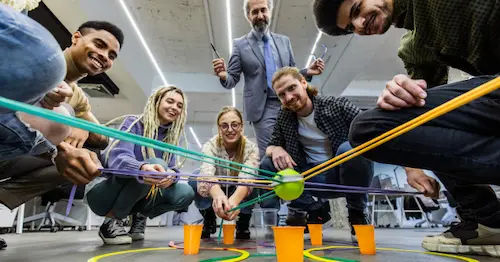Team Culture Singapore

Welcome to the vibrant heart of Southeast Asia, where the fusion of cultures creates a dynamic backdrop for team-building and unity!
Singapore, with its unique blend of tradition and innovation, offers an unparalleled setting for cultivating a thriving team culture.
Whether you’re navigating the bustling streets, indulging in the diverse culinary delights, or exploring the lush green spaces, the opportunities for strengthening bonds and fostering a sense of belonging are endless.
Get ready to be inspired and to inspire, as we dive into the secrets of creating a cohesive, energetic, and productive team environment in this extraordinary city!
Understanding Team Culture in Singapore
Before diving into cultivating cohesion, it’s essential to understand the concept of team culture in Singapore.
Singapore is a multicultural society, with four official languages and people from various ethnicities and backgrounds living together harmoniously. This diversity is not only reflected in the Singapore’s population but also within organizations.
In Singaporean workplaces, team culture revolves around respect for different cultures and values, open communication, and collaboration. Hierarchical structures are prevalent, but teamwork and inclusivity are highly valued.
Singapore work culture or local culture is heavily influenced by Confucian values such as loyalty, respect for authority, and harmonious relationships. These values promote a sense of unity within the team and encourage members to work towards a common goal.
The Importance of Cultivating Cohesion
Having a cohesive team culture is essential for any organization, as it directly impacts productivity, job satisfaction, and overall success.
In Singapore’s highly competitive business environment, where teamwork and collaboration are highly valued, having a strong sense of cohesion can give teams a competitive edge.
A cohesive team also fosters a positive work culture or environment, where individuals feel supported and motivated to perform their best. This leads to higher job satisfaction and retention rates, ultimately contributing to the organization’s overall success.
Moreover, a strong team culture can also improve communication and decision-making processes within the team, leading to more efficient problem-solving and better results.
Key Elements of a Thriving Team Culture
- Respect for Diversity and Inclusion: Acknowledging, respecting, and leveraging the diverse backgrounds, skill sets, perspectives, and personalities within the team.
- Open and Honest Communication: Encouraging transparent communication channels where feedback, ideas, and concerns can be freely shared.
- Collaboration and Teamwork: Promoting a collaborative environment where everyone works towards common goals, supporting each other’s efforts.
- Trust and Integrity: Building a foundation of trust among team members, where integrity is upheld, and promises are kept.
- Recognition and Appreciation: Regularly acknowledging and appreciating the efforts and achievements of team members, reinforcing positive behavior and contributions.
- Continuous Improvement and Learning: Fostering a culture of growth where team members are encouraged to learn, innovate, and improve continuously.
- Adaptability and Flexibility: Being able to quickly adapt to change and remain flexible in the face of challenges, promoting resilience within the team.
- Work-Life Balance: Encouraging a healthy balance between professional responsibilities and personal life, ensuring team members are well-rested, motivated, and focused.
Strategies for Cultivating Cohesion
1. Organize Team-Building Activities

Schedule regular team-building activities that are both enjoyable and meaningful, allowing team members to bond and understand each other better. These activities can range from problem-solving challenges to casual social events, ideally blending Singapore’s work culture aspects.
2. Implement a Mentorship Program

Foster a culture of mentorship where more experienced team members guide newer ones. This not only helps in skill development but also in building strong interpersonal relationships within the team.
3. Encourage Cross-Cultural Workshops

Given Singapore’s multicultural environment, conducting workshops that educate team members about different cultures can enhance mutual respect and understanding, which is crucial for cohesion.
4. Develop Clear Communication Channels

Establish clear and open channels of communication where team members can freely express their ideas, concerns, and feedback. Utilizing various communication tools can ensure that everyone, regardless of their role or location, stays connected and informed.
5. Celebrate Team Successes Together

Make it a point to celebrate milestones and successes as a team. Recognizing individual and team achievements through small gatherings, awards, or shout-outs can significantly boost morale and foster a sense of unity and pride in collective accomplishments.

A compelling vision provides teams with a sense of purpose and direction, guiding their efforts towards common goals and objectives. By involving team members in the vision-setting process and ensuring alignment with organizational values, leaders can inspire commitment and enthusiasm, fostering a strong sense of cohesion and unity within the team.
7. Investing in Team Development

Continuous investment in training, development, and team-building initiatives is essential for nurturing a thriving team culture. By providing opportunities for skill development, career growth, and personal enrichment, organizations demonstrate their commitment to the well-being and professional growth of their teams.
Team-building activities, workshops, and coaching programs can strengthen relationships, improve communication, and enhance teamwork, ultimately contributing to a more cohesive and high-performing team culture.
Challenges to Team Cohesion in Singapore
Despite the strategies in place to foster team cohesion, several challenges still persist in Singapore’s diverse workforce. These include:
- Cultural Misunderstandings: With a workforce comprising various ethnicities, languages, and cultures, there can be occasional misunderstandings or misinterpretations of behaviors and communications.
- Language Barriers: Even though English is widely used in business, language barriers can still arise, especially among team members who are more comfortable with their native languages.
- Adapting to Rapid Change: Singapore’s fast-paced business environment requires teams to constantly adapt to new technologies and market demands, which can strain cohesion if not managed well.
- Work-Life Balance Concerns: The pressure to perform in such a competitive environment might lead some team members to prioritize work over personal time, leading to burnout and reduced team engagement.
- Interdepartmental Competition: In some organizations, competition between departments can hinder the development of a cohesive team culture, as it focuses on individual or departmental successes over team achievements.
- Remote Work Challenges: With the increase in remote and flexible working arrangements, maintaining the same level of cohesion without regular face-to-face interactions can be challenging.
Recommended Cohesion Activities
1. Clay Making Workshop

The Clay Making Workshop offers an engaging opportunity for team members to bond. Through the collaborative process of sculpting clay, participants will discover their colleagues’ capabilities and areas for growth. This workshop encourages creative expression and collective effort.
Implementing such activities can enhance team cohesion, creating lasting memories and trust. Organizing this is hassle-free, as the Fun Empire will supply all necessary materials. This allows your team to concentrate on building connections, sharing personal stories, and strengthening camaraderie.
2. Poolball

Poolball merges the excitement of pool and football, allowing players to kick soccer balls into pockets on an oversized pool table, no cue stick required! It’s a fantastic team-building game that fosters values and challenges (minus the paperwork), perfect for enhancing team bonding, particularly for employees who enjoy games and physical activities.
3. Ninja Tag

Ninja Tag serves as an excellent team-building activity. Players are split into groups, aiming to tag and challenge each other in duels. It demands collaboration and strategic planning, with team members coordinating to outmaneuver rival teams based on their selected game modes.
Tap into your gaming prowess and express your passion through these challenges. Gather your friends for this ground session and collectively strive for victory!
4. Escape Room

Passionate about solving mysteries? Ready to tackle the Escape Room challenge, piecing together clues and uncovering secrets? Dive into a new world, captivated by evolving stories and mind-bending puzzles throughout the game.
This game will test your communication abilities, engulf you in mysteries, and fortify the team spirit, ensuring a fun experience! Regardless of the difficulty in describing each clue or object, keep in mind that you’re making lasting memories with each participant. Triumph over the competition today!
5. Candle Making Workshop

Unleash your creativity by crafting a personalized gel candle! Learn a new skill and create a memorable token that celebrates a unique team bonding moment. Personalize your candle with an array of figurines to elevate your creation!
Our Candle Making Workshop fosters team unity and serves as a fantastic team-building exercise for both colleagues and friends. Participants get to express their creativity in a way that’s different from their everyday work tasks.
Team Culture Singapore
Cultivating a cohesive team culture in Singapore’s dynamic and diverse business landscape requires a multifaceted approach, integrating strategies for team bonding, communication, and shared values.
Facing challenges like cultural misunderstandings, language barriers, and the pace of change head-on, organizations can foster environments where collaboration, respect, and mutual understanding flourish.
By emphasizing continuous improvement, adaptability, and recognition, companies can not only enhance team cohesion but also drive innovation and success in a competitive global market.
The path to building and maintaining a strong team culture is ongoing and demands commitment from all levels of an organization, showcasing the importance of unity in achieving collective goals.
Frequently Asked Questions (FAQs)
If you have any questions about Team Culture in Singapore, you can refer to the frequently asked questions (FAQ) about the Cultivating Cohesion for a Thriving Team Culture in Singapore below:
How often should team building activities be organized?
Team building activities should ideally be organized quarterly to maintain and enhance team cohesion. However, this may vary depending on the specific needs and schedules of each team.
Can team building activities be customized according to the team’s profile?
Yes, most team building activity providers, including those mentioned like the Fun Empire, offer customizable packages that can be tailored to fit the unique preferences and objectives of your team.
Are there virtual team building options available for remote teams?
Absolutely. Many team building activity providers have adapted to the rise of remote work by offering virtual versions of their most popular activities, ensuring that even teams working from different locations can enjoy engaging and effective team building experiences.
What measures are in place to accommodate team members with disabilities in these activities?
Activity providers are committed to inclusivity and can adjust activities to accommodate team members with disabilities. It’s recommended to discuss specific needs with the provider in advance so they can make necessary preparations.
How can we measure the success of team building activities?
The success of team-building activities can be gauged through employee feedback, observing improvements in team dynamics, and measuring changes in productivity and employee engagement levels before and after the activities.
How does Singaporean work culture differ from Western cultural influences?
Singaporean work culture is characterized by a blend of Eastern and Western influences due to its diverse population and historical ties. While Western cultural influences may emphasize individualism and autonomy, Singaporean work culture often values teamwork, collaboration, and respect for authority. Understanding and navigating these cultural nuances is essential for fostering cohesion within teams in Singapore.
How can teams manage challenges arising from too many wild ideas during business meetings?
Encouraging open communication and establishing clear objectives can help teams manage the influx of ideas during business meetings. By providing guidelines for idea generation and prioritization, teams can harness creativity while ensuring focus and alignment with organizational goals.
How does hierarchical relationships impact group harmony in Singaporean workplace culture?
In Singaporean workplace culture, hierarchical relationships are often present, with respect for authority playing a significant role. However, fostering open communication channels and promoting a culture of mutual respect can mitigate the negative impacts of rigid hierarchies, enabling teams to collaborate effectively while maintaining group harmony.
What strategies can local companies employ to prioritize employee well-being amidst diverse cultures in the job market?
Local companies can prioritize employee well-being by implementing initiatives such as flexible work arrangements, wellness programs, and diversity training. By promoting inclusivity, understanding cultural differences, and supporting work-life balance, companies can create a supportive environment that enhances employee satisfaction and retention.
How can local firms navigate culture shock when collaborating with foreign companies in Singapore?
Local firms can navigate culture shock by fostering cross-cultural understanding, providing cultural sensitivity training, and establishing clear communication channels. By recognizing and respecting cultural differences, local firms can build strong partnerships with foreign companies while leveraging diverse perspectives to drive innovation and healthy competition in the Singaporean business landscape.







